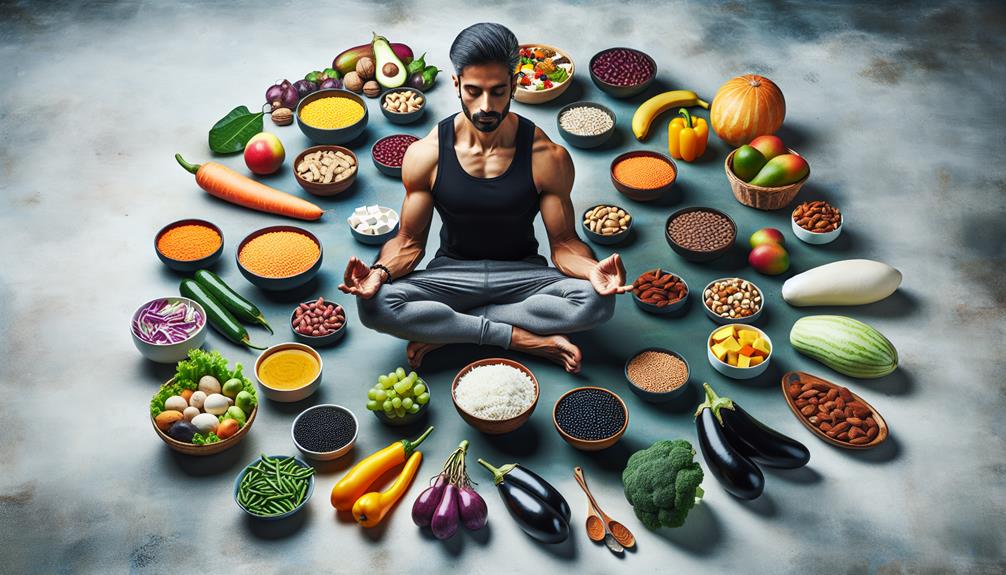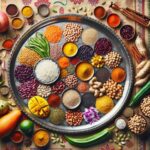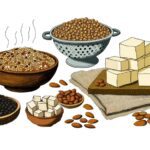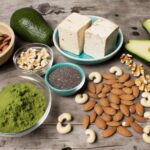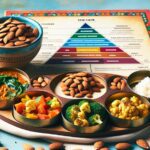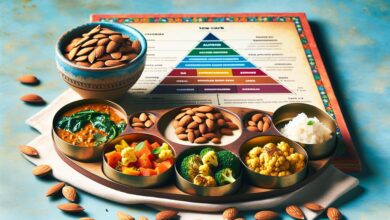In the realm of athletic performance, the role of diet cannot be overstated, particularly when considering the unique demands of a vegan regimen. Indian cuisine, with its cornucopia of plant-based ingredients and spices, offers a promising canvas for vegan athletes seeking to meet their nutritional needs. However, the intricacies of balancing macronutrients and ensuring adequate intake of essential amino acids, vitamins, and minerals present a complex challenge. Within this context, the optimization of an Indian vegan diet plan for athletes necessitates a thoughtful integration of protein-rich legumes, nutrient-dense vegetables, and energy-sustaining grains, tailored to the rigors of their training and performance schedules. By addressing these considerations, one may begin to explore the potential of a well-crafted diet plan to not only sustain but enhance athletic prowess.
Key Takeaways
- Undertake a comprehensive nutritional assessment based on sport, training regimen, and physiological characteristics
- Harmoniously balance macronutrients, including carbohydrates, vegan protein sources, and healthy fats
- Ensure intake of essential micronutrients through a diverse array of plant-based foods and fortified options
Assessing Nutritional Requirements
To optimize performance and health, it is imperative for vegan athletes to undertake a comprehensive nutritional assessment that considers their individual energy and nutrient demands based on their specific sport, training regimen, and physiological characteristics. This evaluation is pivotal to maintaining a vegan diet without detriment to their athletic aspirations or wellbeing. Each athlete requires optimization of their diet to support the rigors of training and competition.
A major consideration is the quality of dietary protein, as plant-based proteins may need careful combination to provide all essential amino acids. Understanding protein intake from diverse plant sources is crucial for muscle repair and growth. Moreover, attention to specific micronutrients (e.g., iron, calcium, vitamin B12, and vitamin D) is necessary to prevent deficiencies that could impair performance.
Energy intake must be calibrated to support the physical demands placed upon the body, ensuring adequate fuel for both endurance and strength disciplines. Collaborating with a nutrition professional can aid in the strategic inclusion of nutrient-dense foods and appropriate supplementation to meet nutritional requirements. This personalized approach helps vegan athletes to excel, honoring their ethical choices while nurturing their bodies for peak performance.
Balancing Macronutrients
Achieving a harmonious balance of macronutrients is a cornerstone of an Indian vegan athlete’s diet, as it fuels their rigorous physical exertions and aids in muscle regeneration and recovery. Carbohydrates are paramount in meeting the energy requirements of athletes, serving as the primary source of fuel during prolonged physical activity. Traditional Indian staples like rice, millets, and legumes not only uphold cultural dietary practices but also offer a bounty of complex carbohydrates necessary for sustained energy.
Protein requirements for muscle protein synthesis can be met with a diversity of vegan protein sources, such as lentils, chickpeas, and tofu. These plant proteins are rich in essential amino acids, which are vital for athletes following a vegan diet to ensure optimal performance and prevent low energy availability. Including a variety of these foods helps in covering the spectrum of amino acids necessary for muscle repair.
Healthy fats from nuts, seeds, and avocados should not be overlooked as they contribute to nutrient absorption and provide a concentrated source of energy. By mindfully selecting an array of plant-based foods, a vegan diet is likely to offer a well-rounded nutritional profile, supporting the high demands of athletic endeavors.
Incorporating Essential Micronutrients
A well-structured Indian vegan diet plan for athletes must encompass a diverse array of plant-based foods to ensure adequate intake of essential micronutrients such as iron, calcium, vitamin B12, vitamin D, and omega-3 fatty acids, which are critical for maintaining optimal health and athletic performance. These micronutrients support various physiological functions, including muscle recovery, bone health, and oxygen transport—vital for athletes who impose high demands on their bodies.
To enhance the vegan diet with these vital components, consider the following strategies:
- Iron Absorption: Enhance iron absorption by pairing iron-rich plant foods like lentils and spinach with vitamin C-rich foods such as bell peppers and oranges. Be mindful of iron deficiency, common among athletes, by scheduling regular dietary assessments.
- Calcium and Vitamin D: Fortified plant milks and juices can provide both calcium and vitamin D, critical for bone health. Exposure to sunlight is also a natural way to boost vitamin D levels, complementing dietary sources.
- B12 and Omega-3s: Regular intake of fortified foods or supplements is essential to prevent deficiencies in vitamin B12 and essential fatty acids. Iodine deficiency in vegetarians can be addressed with the inclusion of iodized salt or seaweed.
Working with nutrition professionals can guide athletes in creating a nutritionally complete vegan diet, assuring all vitamins and minerals are adequately provided to serve their performance and recovery needs.
Meal Timing Strategies
Understanding when to eat in relation to training is as crucial as the nutritional content of a vegan athlete’s diet, with meal timing strategies playing a pivotal role in energy management and muscle repair. Vegan sports nutrition requires meticulous planning to meet the demands of an athlete’s regimen. The precise timing of meals can significantly affect performance, ensuring a steady supply of energy and the necessary materials for muscle recovery and growth.
Vegetarian diets, including veganism, must deliver adequate dietary protein and specific micronutrients that are vital for an athlete’s health and performance. Food choices should be carefully selected to provide a spectrum of nutrients, with a focus on the timing of intake to optimize glycogen stores for sustained energy output. For instance, consuming complex carbohydrates and proteins before training can fuel the body, while a post-workout meal rich in protein aids in muscle repair.
Regularly spaced meals and snacks throughout the day help maintain stable blood glucose levels, contributing to consistent energy. Athletes should customize their food choices around their training schedules to ensure peak performance and expedited recovery. By integrating cultural insight with plant-based nutrition, one can craft a diet that not only supports athletic ambitions but also aligns with compassionate lifestyle choices.
Hydration and Electrolytes Management
While meal timing is integral to an athlete’s energy and recovery, equally important is the role of hydration and electrolytes management in sustaining peak physical performance. Vegan athletes must be vigilant in planning and adopting a hydration strategy that meets their specific training and performance goals. Fluid loss through sweat must be countered with adequate water intake, and the replenishment of electrolytes is crucial to maintaining the balance necessary for muscle function.
Here are three key aspects to consider:
- Monitor Hydration Levels: Athletes should regularly check their hydration status, particularly before and after exercise, to prevent dehydration and its adverse effects on athletic performance.
- Balanced Electrolyte Intake: Incorporate natural vegan sources of sodium, potassium, and magnesium, such as coconut water, bananas, and leafy greens, to maintain electrolyte levels.
- Personalized Nutrition Advice: Consulting with a sports nutritionist can help tailor nutrient intakes, including fluids and electrolytes, to individual needs, optimizing the vegan diet for athletic excellence.
Understanding cultural dietary patterns and integrating them with sports nutrition principles is paramount. Vegan athletes can leverage plant-based foods rich in electrolytes to support their endeavors, ensuring that their compassionate lifestyle choices harmoniously align with their athletic ambitions.
Frequently Asked Questions
Can Athletes Perform Well on a Vegan Diet?
Athletes can excel on a vegan diet if it includes nutrient-dense foods with ample plant-based proteins, effective iron absorption, and B12 considerations, ensuring sustained energy levels and muscle recovery, sometimes supplemented with omega-3 and hydration strategies.
What Does Nimai Delgado Eat in a Day?
Nimai Delgado’s daily intake focuses on plant-based proteins, prioritizing meal timing for optimal energy requirements and muscle recovery. His meal planning includes dietary supplements, with attention to iron intake and hydration strategies for sustained workout fuel.
What Vegan Athletes Eat in a Day?
Vegan athletes typically prioritize plant-based proteins, ensuring adequate iron intake and energy sources. They focus on recovery foods, nutrient timing, and meeting caloric requirements, often using supplement essentials and hydration strategies, with vegan snacks for muscle building.
